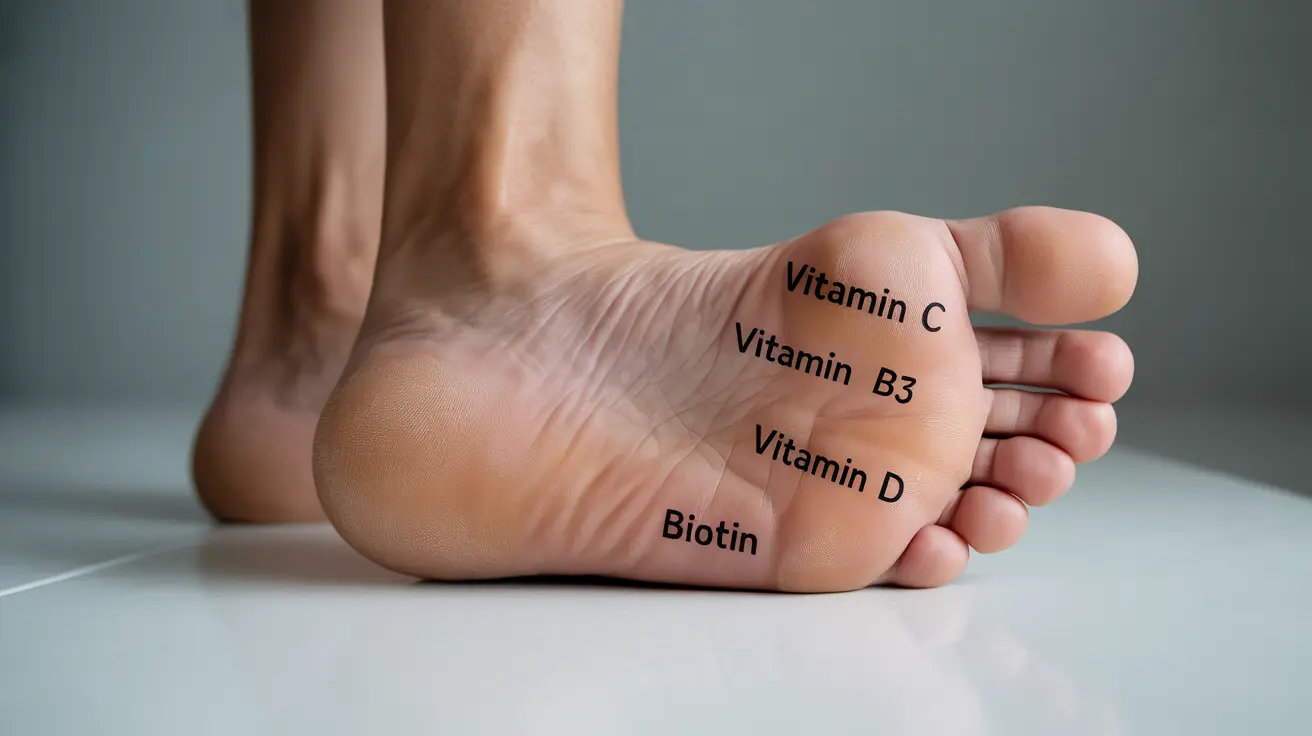Experiencing extremely dry feet can be both uncomfortable and concerning, especially when traditional moisturizing treatments don't seem to help. While many factors can contribute to dry, cracked feet, vitamin deficiencies often play a significant but overlooked role in foot health. Understanding this connection can be crucial for finding effective long-term solutions.
In this comprehensive guide, we'll explore how vitamin deficiencies can affect foot health, identify key nutrients needed for healthy skin, and discuss practical solutions for managing extremely dry feet through nutrition and lifestyle changes.
Understanding the Vitamin-Foot Health Connection
The skin on our feet relies on various vitamins and nutrients to maintain its integrity and moisture balance. When certain vitamins are lacking, it can lead to noticeable changes in skin health, particularly in areas that experience frequent pressure and friction, like our feet.
Key Vitamins for Foot Health
Several essential vitamins play crucial roles in maintaining healthy foot skin:
- Vitamin C: Supports collagen production
- Vitamin E: Provides antioxidant protection
- Vitamin B3 (Niacin): Helps retain skin moisture
- Vitamin D: Promotes skin cell renewal
- Biotin: Supports healthy skin structure
Signs of Vitamin Deficiency in Feet
Vitamin deficiency can manifest in various ways when it affects foot health:
- Persistent dryness despite moisturizing
- Deep cracks in the heels
- Flaking or peeling skin
- Increased sensitivity
- Slow healing of minor cuts or cracks
Nutritional Solutions for Healthy Feet
Addressing vitamin deficiencies through diet can significantly improve foot health. Focus on incorporating these nutrient-rich foods:
- Citrus fruits and berries (Vitamin C)
- Nuts and seeds (Vitamin E)
- Whole grains (B vitamins)
- Fatty fish (Vitamin D)
- Eggs and lean meats (Biotin)
Prevention and Treatment Strategies
A comprehensive approach to managing extremely dry feet should include both nutritional and topical treatments:
Dietary Approaches
- Regular consumption of vitamin-rich foods
- Adequate water intake
- Balanced meal planning
Topical Care
- Regular moisturizing
- Gentle exfoliation
- Protective footwear
- Overnight moisture treatments
When to Seek Medical Help
While vitamin deficiency can cause extremely dry feet, it's important to know when to consult a healthcare provider:
- Deep, painful cracks that won't heal
- Signs of infection
- Severe scaling or peeling
- Concurrent symptoms in other body areas
- No improvement with home care after several weeks
Frequently Asked Questions
Can a lack of vitamins like C, E, or B-3 cause extremely dry feet or cracked heels, and how common is this? Yes, vitamin deficiencies can contribute to extremely dry feet and cracked heels. While not the most common cause, studies suggest that inadequate levels of vitamins C, E, and B-3 can affect skin health and moisture retention. This is particularly common in individuals with restricted diets or absorption issues.
What are the best foods to eat to help prevent dry feet and cracked heels if I think I have a vitamin deficiency? Focus on consuming foods rich in essential vitamins: citrus fruits, bell peppers, and strawberries for vitamin C; nuts, seeds, and vegetable oils for vitamin E; and lean meats, fish, and fortified cereals for B vitamins. A varied, balanced diet typically provides adequate nutrition for healthy skin.
What are the main symptoms of vitamin deficiency linked to dry, cracked feet, and how are they different from other causes? Vitamin deficiency-related foot symptoms often include persistent dryness despite moisturizing, slow healing of cracks, and concurrent skin issues in other body areas. Unlike mechanical causes, these symptoms typically don't improve with topical treatment alone and may be accompanied by other deficiency signs like fatigue or brittle nails.
When should I see a doctor for cracked heels, and what other conditions could be causing my symptoms besides vitamin deficiency? Consult a healthcare provider if you experience deep, painful cracks, signs of infection, or no improvement after several weeks of home care. Other potential causes include diabetes, eczema, psoriasis, fungal infections, or thyroid conditions.
What home remedies or lifestyle changes can help heal dry, cracked heels, and when should I consider supplements? Effective home remedies include regular moisturizing, gentle exfoliation, wearing socks to bed, and using heel balms. Consider supplements only after consulting with a healthcare provider who can test for specific deficiencies and recommend appropriate dosages. Focus first on improving dietary intake of essential nutrients.




